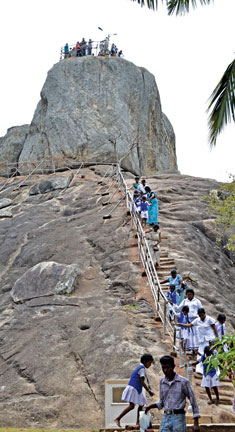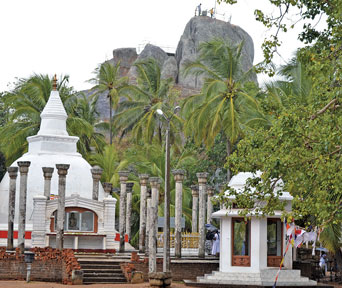Poson heralds advent of Buddhism
By Ananda KANNANGARA
 According to Buddhist history, many important events had taken place
on the Poson Full Moon Poya Day. It was on this day that a Buddhist
mission, led by Ven. Arahat Mahinda Thera,the son of Emperor Dharmasoka
of India arrived in Sri Lanka to introduce Buddhism. According to Buddhist history, many important events had taken place
on the Poson Full Moon Poya Day. It was on this day that a Buddhist
mission, led by Ven. Arahat Mahinda Thera,the son of Emperor Dharmasoka
of India arrived in Sri Lanka to introduce Buddhism.
The Thera arrived with four Bhikkhus, Itthiya, Uttiya, Sambala and
Bhaddhasala, Sumana samanera and a Upasaka Bhanduka.
The Thera first met King Devanampiyatissa, who was the king at
Anuradhapura.
When the Thera arrived the king was engaged in the ceremonial deer
hunting at the Mount of Mihintale with a retinue of 40,000 men. He first
delivered a discourse based on the Chulla hattipadopama Sutta to the
king and his men.
The advent of Buddhism to Sri Lanka took place around 236 BC, about
250 years after the Buddha's passing away.
The king invited the Thera to visit the city and the villages. The
Thera also conferred ordination and higher ordination to Upasaka
Bhanduka who later attained Arahatship.
From then onwards Poson festival was celebrated by king
Devanampiyatissa. The king took measures to propagate Buddhism all over
the country. He constructed dagabas, temples and aramayas to enable
devotees to carry out religious activities.
Although Vesak is celebrated all over the country in May, Poson is
celebrated in Anuradhapura, Polonnnaruwa and Mihintale. Thousands of
pilgrims visit the ancient cities in June to participate in religious
activities such as Pahan poojas, Buddha poojas, Bodi poojas and Sil
campaigns. Over 100,000 Buddhists observe Sil at temples in the ancient
cities during the poson season.
When Ven. Mahinda thera arrived, the king had gone on deer hunting.
Arahat Mahinda thera, addressed the king as “Tissa, Tissa” with the aim
of drawing his attention.
The king was shocked to hear someone addressing him by his first
name. When he looked up, he saw a bhikkhu on top of the rock.
The king inquired as to who he was, in great reverence. Then the
Arahat politely replied.
‘Samana mayam Maharaja Dhamma rajassa savaka Taveva anukampaya
Jambudipa idha gata.’
(We are bhikkhus, great king, the disciples of the King of Truth .
Purely out of compassion for you, we have come here from India)
The king wished to know how he arrived on that solitary spot, high on
top of the rock.
Arahat Mahinda then told the King that they came neither by water nor
by land. The intelligent King inferred that they had arrived by air.
He was delighted and promptly laid down his weapons. Then he sat down
with his retinue to hear the Dhamma.
 However, the Ven. Thera, before expounding the Dhamma tested the
intelligence of the King by asking him some simple questions: However, the Ven. Thera, before expounding the Dhamma tested the
intelligence of the King by asking him some simple questions:
“What is the name of this tree, O King“?
“This tree is called a mango tree,”
“Is there yet another mango tree beside this?”
“There are many mango trees.”
“And are there yet other trees beside this mango and other mango trees?”
“There are many trees, Sir, but they are not mango trees.”
“And are there, besides the other mango trees and those trees which
are not mango trees, yet other trees?”
(The Mahavamsa)
The king answered each questions sensibly. Thereupon the Arahath
Mahinda delivered the “Chulla Haththipadopama Sutta”
This eventually led to the establishment of Buddhism in the country.
This important discourse the Chulla Haththipadopama Sutta describes
the life of an ideal Bhikkhu and the different stages of mental
development leading up to the ultimate goal, Nibbana. Immediately, the
king embraced the new teaching and became a follower of the Buddha. His
retinue followed suit.
After the departure of the king and his followers, the lay disciple
Bhanduka was granted the lesser (Pabbajja) and the higher ordination
(Upasampada) by the Sanga. Soon after he attained Arahathship becoming
the first Arahath in Sri Lanka.
Later as instructed by Arahat Mahinda, Sumana Samanera standing on
the summit of the Aradhanagala, said that it was time to hear the Dhamma
. By means of his physic powers, he made his voice heard throughout
Lanka.
The day after their arrival, Arahath Mahinda and the other bhikkhus
went to the city as invited by the king and the Arahath expounded the
simple and the higher teachings of the Buddha for seven days. After
listening to the Dhamma Queen Anula attained Sovan.
As Queen Anula expressed her desire to enter the order, Arahath
Mahinda sent envoys to his sister, Bhikkhuni Sangamitta. She readily
responded to her brother's invitation and arrived in Sri Lanka with a
sapling of the sacred Bodhi tree which was planted at Mahamevuna Uyana,
Anuradhapura. She was accompanied by a number of scholars, and artisans.
The advent of Buddhism led to the political, intellectual, cultural and
spiritual development.
Today the people of Sri Lanka have earned the respect of the world
community because they have lived according to the Buddhist concepts of
kindness, compassion, generosity, hospitality and tolerance. |

